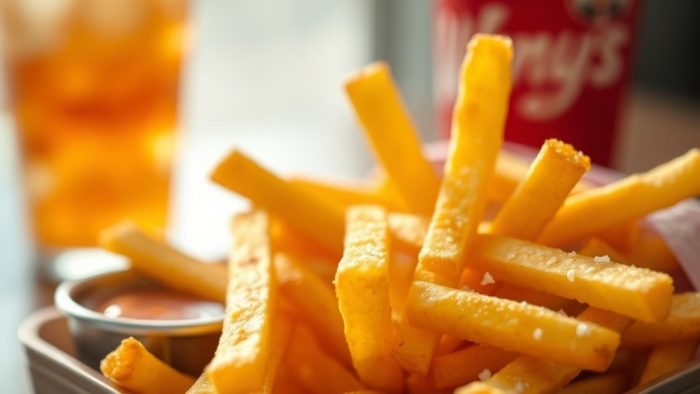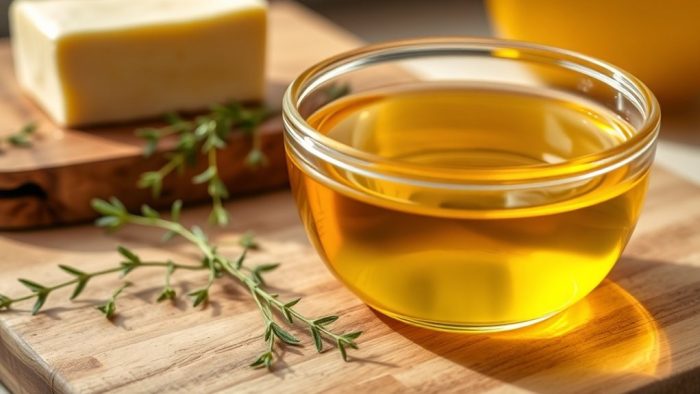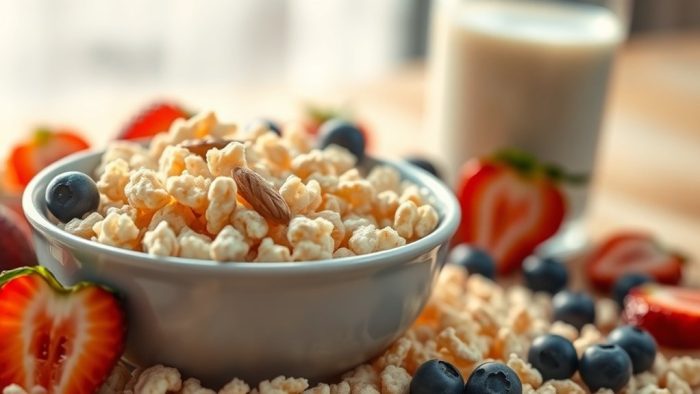Is This Beer Vegan
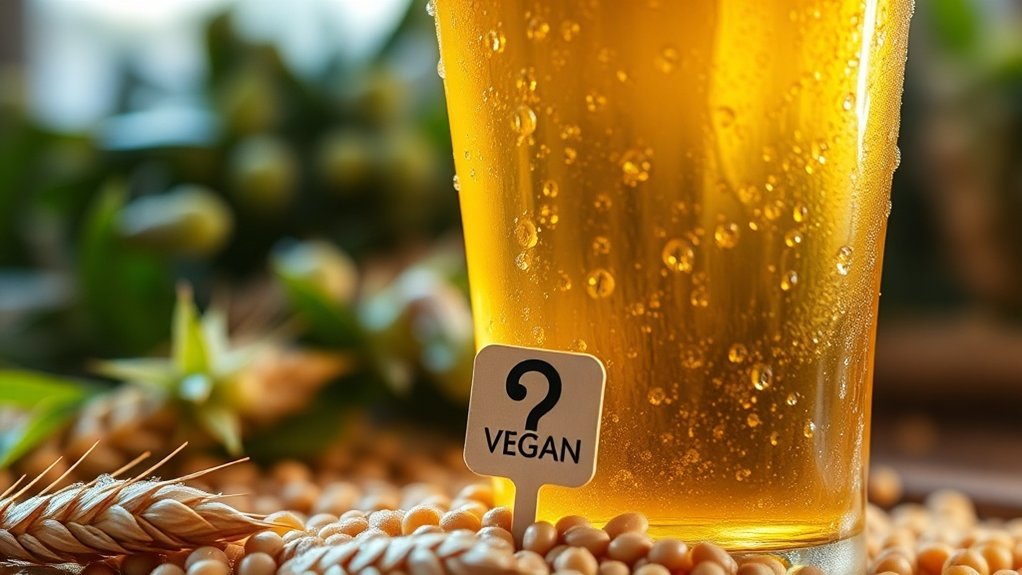
Your beer likely isn’t vegan if it’s been clarified with isinglass (fish bladder collagen), gelatin, or egg albumin—animal-derived fining agents that manufacturers aren’t required to list on labels. Certain styles like milk stouts contain lactose, while honey beers and many cask ales automatically fail vegan criteria. You’ll need to verify through resources like Barnivore’s database or brewery websites, since processing aids remain invisible to consumers. Many craft and mass-market brands now use plant-based alternatives like Irish moss or silica gel, though formulations change without notice, making verification essential before each purchase.
Understanding Animal-Derived Ingredients in Beer Production
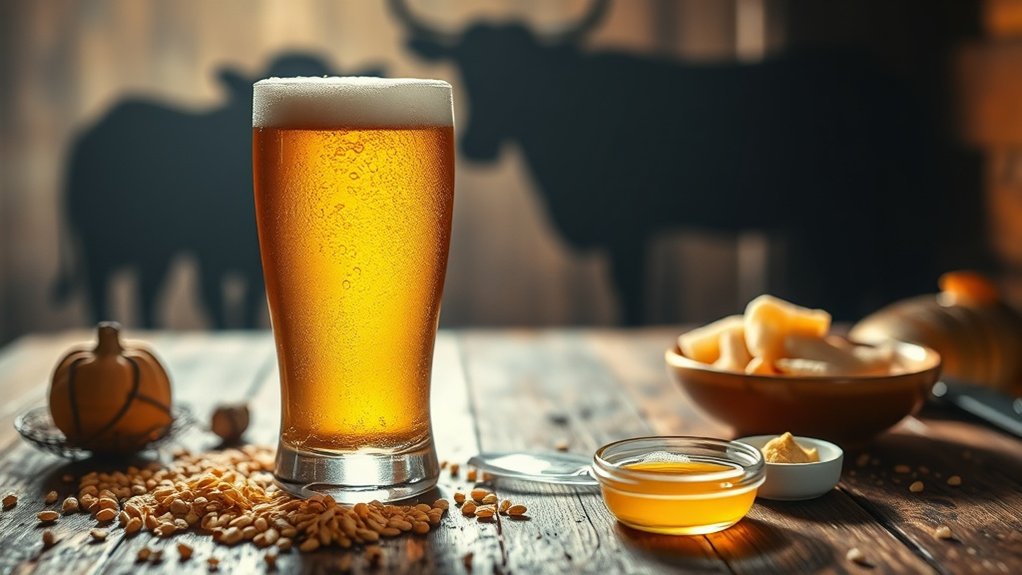
While beer traditionally consists of four primary ingredients—water, malted barley, hops, and yeast—the production process often introduces animal-derived components that compromise its vegan status.
You’ll find isinglass, extracted from fish swim bladders, serves as a clarifying agent during filtration. Gelatin and egg whites perform similar functions, binding to suspended particles for clearer beer.
When you’re examining what’s a vegan beer, you must consider lactose in milk stouts—this milk-derived sugar remains unfermented, adding body and sweetness. Honey represents another non-vegan additive that brewers incorporate for flavor complexity.
The challenge you’ll face is identification: manufacturers aren’t required to disclose these processing aids on labels, since they’re technically removed before bottling. This opacity necessitates direct brewery contact or consulting vegan certification databases.
Common Fining Agents That Make Beer Non-Vegan
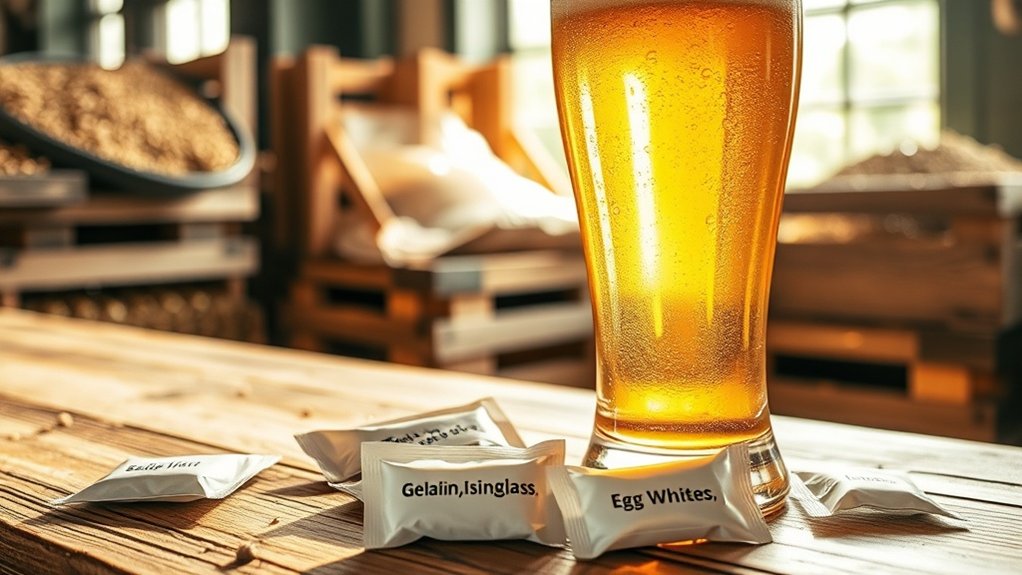
Beer clarification frequently relies on animal-derived fining agents that precipitate suspended particles through protein interactions.
Isinglass (collagen from fish swim bladders) and gelatin (derived from mammalian connective tissue) serve as traditional clarifying agents, while albumin from egg whites or blood provides additional protein-based fining capacity.
Plant-based alternatives such as Irish moss (carrageenan), bentonite clay, and silica gel achieve comparable clarification through different physicochemical mechanisms, rendering the final product suitable for vegan consumption.
Animal-Derived Clarifying Agents
Although beer appears to contain only plant-based ingredients like water, hops, malt, and yeast, the clarification process often introduces animal-derived substances that compromise its vegan status.
Isinglass, extracted from fish swim bladders, functions as a primary fining agent in traditional brewing operations. Its collagen proteins bind to suspended particles, facilitating their removal from solution.
Gelatin, produced from animal connective tissues, operates through similar mechanisms to eliminate haze-causing compounds. Additionally, albumin—sourced from egg whites or blood—serves as an effective clarifying agent.
Beyond fining agents, lactose presents another concern. This milk-derived disaccharide appears in specific styles like milk stouts, adding residual sweetness and body.
Since manufacturers aren’t required to disclose these processing aids on labels, you’ll need to contact breweries directly to verify vegan compliance.
Plant-Based Vegan Alternatives
Fortunately, modern brewing technology offers several plant-based fining agents that replicate the clarification properties of animal-derived compounds without compromising vegan principles.
Carrageenan, extracted from red seaweed, functions as an effective clarifying agent by binding to haze-causing proteins and precipitating them from solution. This polysaccharide achieves comparable results to isinglass without animal derivatives.
Biofine, another widely adopted alternative, utilizes a two-component system of silica sol and isinglass-free ingredients to remove particulate matter efficiently.
These plant-based options demonstrate that breweries can maintain beer clarity and visual appeal while adhering to vegan standards. You’ll find these alternatives increasingly prevalent as consumer demand for vegan-certified beverages grows.
The brewing industry’s adoption of these compounds enables production of transparent, stable beers that align with plant-based dietary requirements.
How to Verify If Your Beer Is Vegan-Friendly
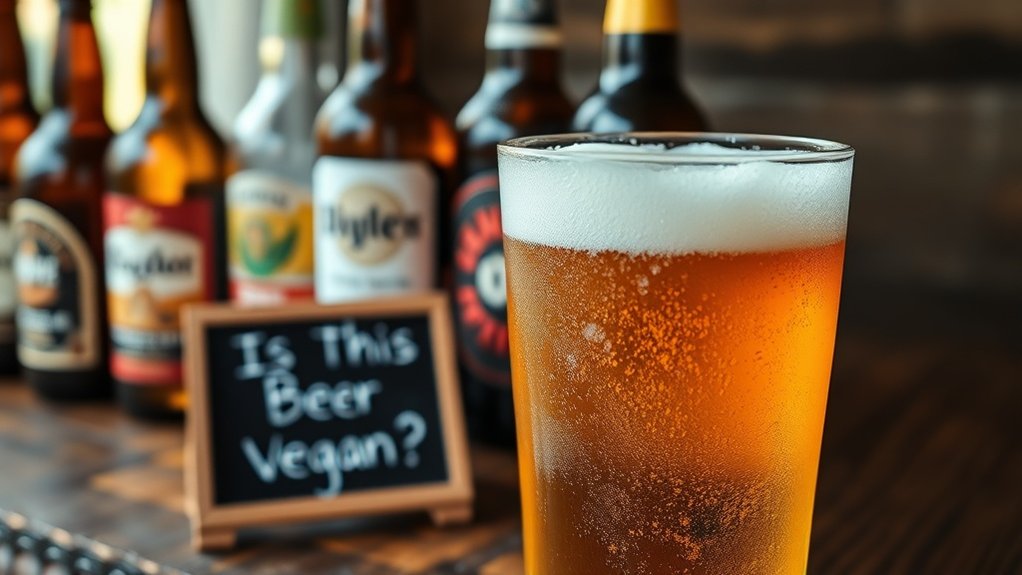
Determining a beer’s vegan status requires systematic verification through multiple channels, as brewing regulations don’t mandate disclosure of processing agents on product labels.
Verification Methods:
- Consult Barnivore Vegan Alcohol Directory – This community-verified database contains 62,910+ entries documenting animal-derived fining agents like isinglass and gelatin used in brewing processes.
- Review brewery websites and contact manufacturers – Request specific information about ingredient sourcing and clarification protocols, as companies aren’t legally obligated to disclose these details.
- Confirm production location – Geographic origin affects vegan status; identical brands may employ different methods regionally (e.g., Red Stripe uses isinglass in Jamaica).
Research hidden animal derivatives including lactose and honey, which labels often omit.
Cross-reference multiple sources to ascertain accuracy, particularly for imported beverages with variable manufacturing standards.
Beer Styles Most Likely to Contain Animal Products
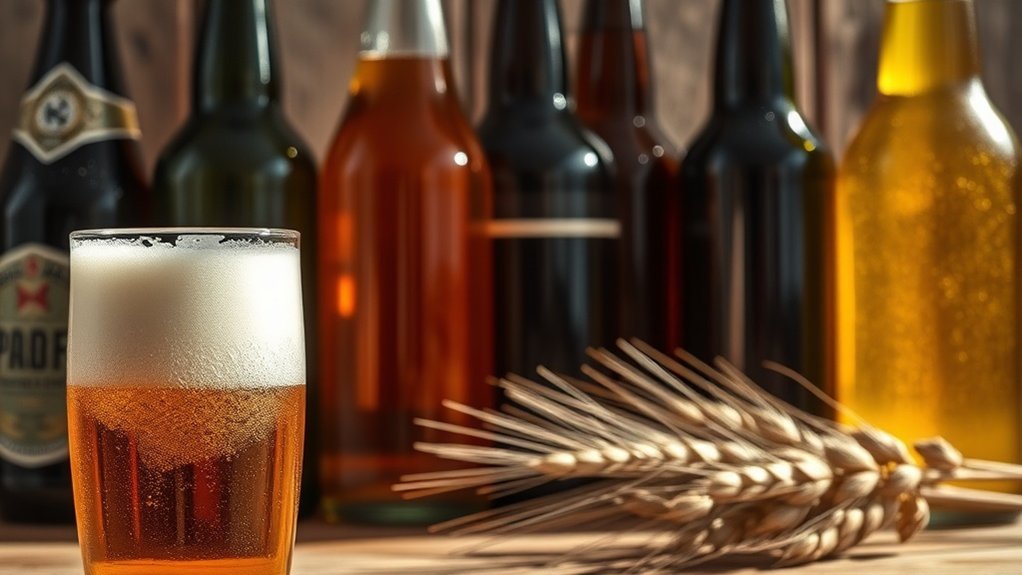
While most beers appear innocuous from their ingredient labels, specific styles systematically incorporate animal-derived components that immediately disqualify them from vegan classification.
Milk stouts contain lactose—a milk sugar that provides residual sweetness and body. You’ll find honey in various cocktails and specialty beers, functioning as both fermentable sugar and flavoring agent.
Cask ales typically employ isinglass (fish swim bladder collagen) for clarification, creating that characteristic brilliant appearance. Certain IPAs and cream ales utilize gelatin as a fining agent to remove haze-causing proteins and polyphenols.
Traditional Belgian ales occasionally incorporate animal ingredients throughout their brewing process, though formulations vary considerably between producers.
Each style presents distinct compositional challenges that necessitate verification through manufacturer inquiry or certified vegan databases before consumption.
Vegan-Friendly Alternatives Used in Modern Brewing
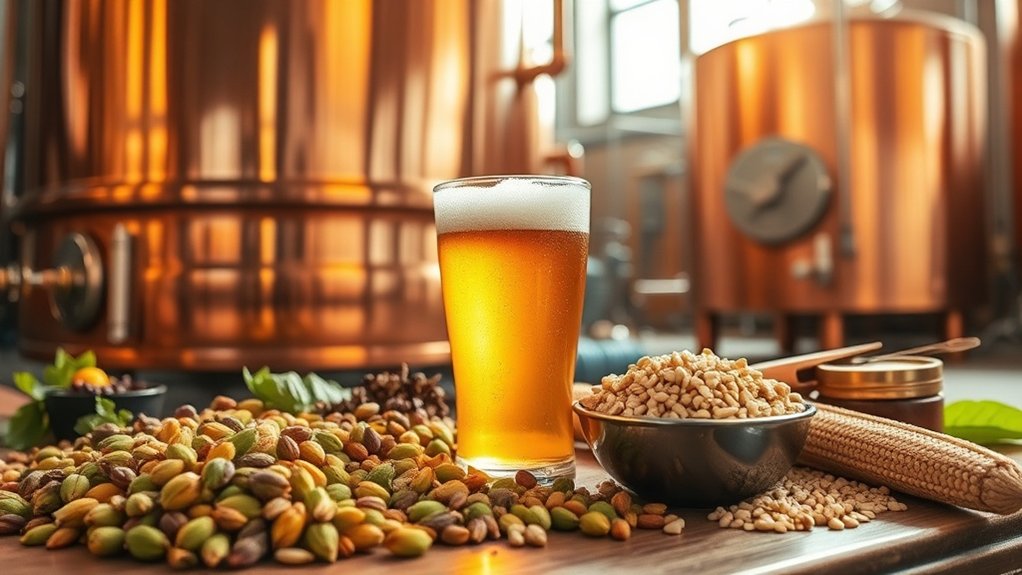
As consumer demand for plant-based products intensifies, breweries have systematically replaced animal-derived fining agents with botanically-sourced alternatives that deliver comparable clarification results.
Primary Vegan Clarifying Solutions:
- Carrageenan – This seaweed-extracted polysaccharide functions as an effective protein coagulant, binding to haze-causing particles and settling them out of suspension during fermentation.
- Biofine – A silica sol-based product that accelerates sedimentation of yeast and protein complexes, reducing processing time while maintaining beer stability.
- Advanced filtration systems – Mechanical processes utilizing diatomaceous earth or crossflow membrane technology eliminate the need for biological fining agents entirely.
You’ll find dedicated vegan breweries now provide thorough ingredient transparency through digital platforms, while mainstream producers increasingly adopt these alternatives.
This technological evolution demonstrates that achieving ideal beer clarity doesn’t require animal-derived materials.
Reliable Resources and Databases for Checking Beer Vegan Status

You’ll need authoritative databases to verify whether animal-derived fining agents or processing aids were used during beer production.
The Barnivore Vegan Alcohol Directory provides community-verified data on over 62,910 alcoholic beverages, documenting specific filtration methods like isinglass usage that manufacturers rarely disclose on product labels.
Cross-referencing Barnivore entries with direct brewery communications guarantees accurate compositional assessment, as many producers now publish detailed ingredient sourcing and processing protocols on their official websites.
Barnivore Vegan Alcohol Directory
When investigating beer’s vegan status, the Barnivore Vegan Alcohol Directory stands as the most thorough verification system available, cataloging over 62,910 entries that span beers, wines, and liquors.
This community-verified database addresses ingredient transparency gaps that standard labeling doesn’t cover, particularly animal-derived fining agents.
Barnivore’s verification methodology guarantees accuracy through:
- Multi-level verification protocols – Each entry undergoes double or triple-checking processes before publication.
- Community contribution system – You can submit additional verification checks to expand coverage.
- Comprehensive ingredient analysis – The database identifies hidden animal components absent from product labels.
You’ll find this resource eliminates guesswork when confirming your preferred beer’s vegan status.
Brewery Websites and Transparency
While third-party databases provide thorough verification systems, direct manufacturer communication through brewery websites offers primary-source transparency that eliminates intermediary interpretation.
You’ll find that larger breweries increasingly disclose fining agents and ingredient sourcing protocols on their digital platforms. Guinness, having implemented vegan reformulation in 2016, exemplifies this trend through detailed process documentation.
However, many breweries don’t provide label disclosure, requiring you to investigate their websites or initiate direct contact for clarification.
Smaller operations often demonstrate improved transparency regarding animal-derived substances in their production methods. This accessibility enables more confident purchasing decisions when you’re equipped with extensive information.
You should systematically verify fining agents—isinglass, gelatin, or albumin—through manufacturer channels, as these clarifying compounds aren’t typically mandated for label inclusion despite affecting vegan compatibility.
Mass-Market and Craft Beers That Are Confirmed Vegan
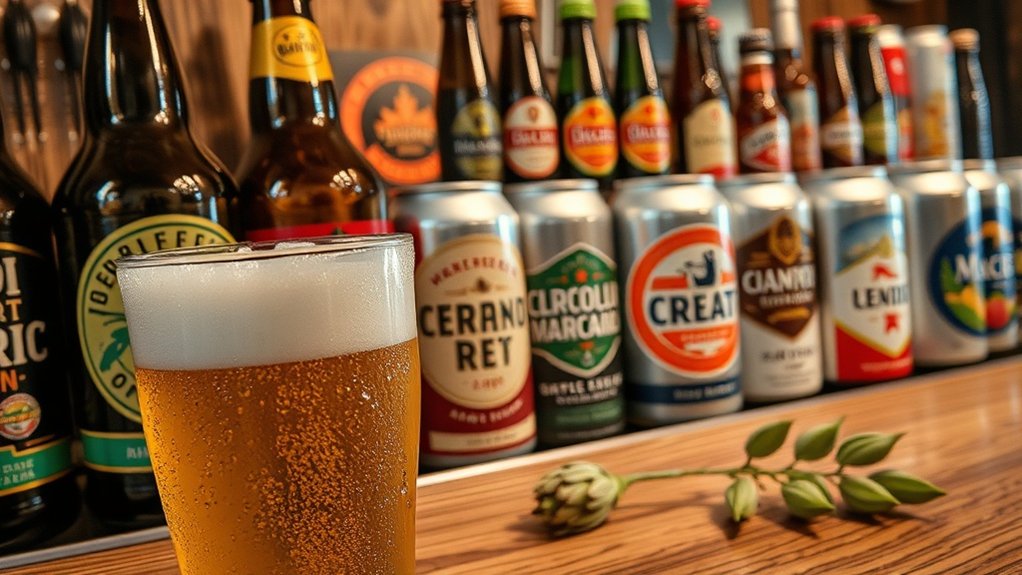
Major beer manufacturers have systematically reformulated their products to eliminate animal-derived fining agents, with Anheuser-Busch’s portfolio (including Budweiser, Michelob, and Stella Artois), MillerCoors brands, and Heineken all achieving vegan certification through the adoption of plant-based clarifying alternatives.
Craft breweries like Sierra Nevada and Dogfish Head now provide ingredient transparency, while traditional brands have undergone reformulation. Notable examples include:
- Guinness Extra Stout – Eliminated isinglass-based fining processes in favor of mechanical filtration systems.
- Belgian ales (Chimay, Gulden Draak) – Utilize natural sedimentation rather than animal-derived clarifying agents.
- Barnivore database – Contains 62,910 verified entries for cross-referencing vegan status across mass-market and craft selections.
You’ll find that awareness of fining agents remains essential, as some breweries still employ isinglass or gelatin, while progressive manufacturers increasingly substitute carrageenan and other plant-based alternatives.
What to Look For on Labels and Brewery Websites

Despite widespread reformulation efforts across the brewing industry, regulatory frameworks don’t mandate disclosure of processing agents on beer labels, leaving consumers without direct access to fining agent information at point-of-purchase.
You’ll need to examine brewery websites where manufacturers voluntarily disclose ingredient compositions and processing methodologies. Search for explicit declarations: “vegan-friendly,” “no animal-derived ingredients,” or “suitable for vegans.”
Identify common animal-derived additives including isinglass (fish bladder collagen), gelatin (bovine or porcine connective tissue), lactose (milk sugar prevalent in milk stouts), and honey.
The Barnivore database provides verified vegan status across thousands of beer brands, eliminating guesswork.
Cross-reference multiple information sources before purchasing, as formulations change without notification. This evidence-based approach guarantees accurate product selection aligned with vegan dietary requirements.


